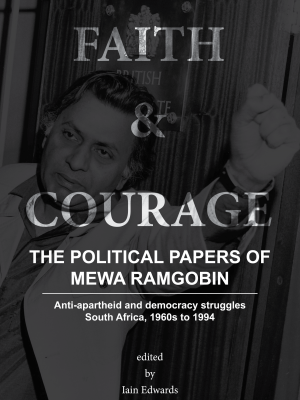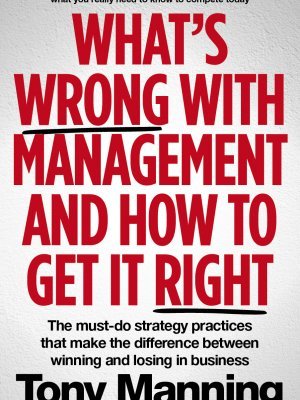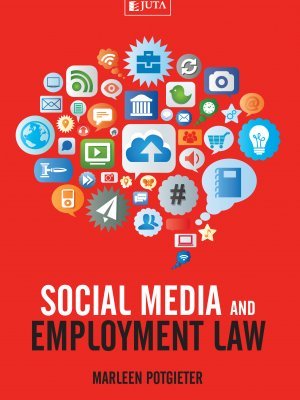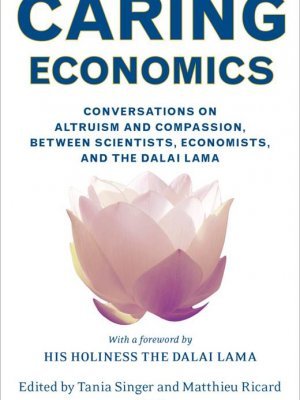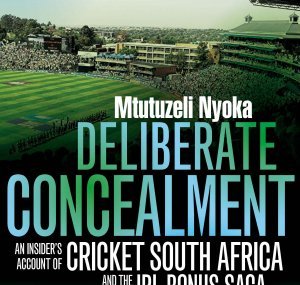
Deliberate Concealment - Mtutuzeli Nyoka - Picador Africa R250
Read this if you need to understand why corporate governance is necessary. Dr. Nyoka recounts the IPL Bonus saga, which engulfed South African cricket between 2009 and 2012, culminating in the dismissal of Cricket South Africa (CSA) CEO Gerald Majola. For much of that period, Nyoka was President of CSA.
With remarkable honesty, Nyoka confesses his own role in the affair. Growing up with Majola in P.E.’s townships, the pair were close friends. When rumours about Majola’s conduct started, Nyoka admits siding with his friend and ignoring the facts. These were two young, black men commanding the heights of sport in a new South Africa; anything said against them was simple racism. Solidarity born of the struggle against apartheid is understandable. But it’s overlaid with an ugly “thou shalt not criticise” attitude. Woe and betide anyone who dared.
Along the way, reasonable, honourable men, acting in cricket’s best interests, like Paul Harris and Barry Skjoldhammer, were pilloried. Nyoka apologises for his blindness.
When the scales fall from his eyes, he is left fighting a lonely, dangerous battle against Majola. At issue - bonuses paid to Majola and, tournament director, Don McIntosh, for the successful staging of the IPL tournament in South Africa.
It’s common cause that the tournament was a huge success, also that Majola and McIntosh deserved reward, which they were duly given by CSA. But unbeknownst to the CSA Board, the pair had also received massive undeclared bonuses from the IPL. Hence the title of Nyoka’s book, Deliberate Concealment.
Nyoka’s story provides deep insight into many of the problems facing broader South Africa at the moment. Many parts of government are just as sensitive to criticism now as Nyoka and Majola were in their pomp. Critics are regularly dismissed as racists. Corruption runs as deep.
The problem, as Nyoka discovered and as the rest of us are learning, is that once entrenched, corruption and its hanger-on, patronage, become remarkably difficult to root out.
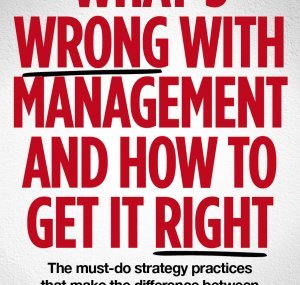
What’s Wrong With Management And How To Get It Right - Tony Manning - Penguin R250
Tony Manning is one of South Africa’s foremost strategy consultants and a prolific author on the subject. So it comes as something of a shock to read his new book which says, in essence, that the Management Emperor has no clothes. Or, to put it differently, there has been nothing new in the development of management theory and practice since Peter Drucker in the 1950s, and much of what he codified had been developed by the likes of Henry Ford and Alfred Sloan half a century earlier.
Into the dustbin, then, go the likes of Tom Peters (In Search of Excellence), Jim Collins (From Good to Great), W. Chan Kim and Renée Mauborgne (Blue Ocean Strategy), Gary Hamel and C.K. Prahalad (The Core Competence of the Corporation) along with a veritable host of boxes, matrices, dashboards and balanced scorecards.
Manning’s compelling argument is that “Every management idea is a framing device - and no more than that”. These are mere tools that force us to think and until “they provoke and shape conversations, they’re worthless”.
He stipulates that those conversations need to revolve around eight critical practices which every single company must study if it wants to be competitive. If you love a glitzy new fad, you may find Manning’s list depressingly close to ordinary, basic common sense. Among the eight:
- Be led by people who are driven to grow their business, and to do it by growing their people
- Learn what’s happening in the world, and adapt, faster than rivals.
- Be highly effective at execution
Be warned, though. The fact that his list is so plain vanilla does not in any sense imply that the task is easy. Apply Manning’s eight practices to your business with rigour, and you will have to think as hard as you have ever thought about anything.
That’s also perhaps Manning’s central message: to do the basics and do them brilliantly - all of them - takes immense mental application and great skill. And there are certainly no magic bullets or instant solutions to help.
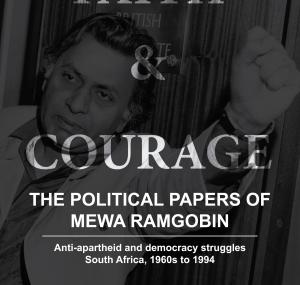
Faith and Courage: The Political Papers of Mewa Ramgobin - Anti-apartheid and democracy struggles, South Africa, 1960s to 1994. Edited by Iain Edwards. amazon.com - $13.67
That apartheid was a monstrous system is common cause and the brutally tragic deaths of the likes of Steve Biko and the Cradock Four are well-documented. Far less so are the lives of lesser luminaries like Durban activist Mewa Ramgobin, a long-time foe of the National Party government, President of the Natal Indian Congress, Treasurer of the United Democratic Front and 1984-85 treason triallist.
GIBS Professor Iain Edwards has moved to redress that imbalance with this meticulous new collection of Ramgobins’s memoirs and political papers, working closely with Ramgobin himself who is well into his 80s. What emerges is not only a picture of considerable personal courage, like so many of his contemporaries, but also of the grinding, soul-destroying bureaucracy of apartheid. Here is man who spent more than a quarter of his adult life under either house arrest or banning orders, which meant strict confinement to a building or a particular suburb, forbidden to meet with friends or relatives or to travel. For example, the sudden sickness of a relative was never an excuse, forcing late-night visits to a Kafka-esque magistrate asking for permission to travel to a Durban hospital. Permission was sometimes granted, sometimes not.
This legal de-humanisation went on year after year, something that has, in my opinion, been quickly forgotten by many who did not experience it first-hand. In that sense, Ramgobin’s decision to allow Edwards access to his papers was important and one which will be of considerable assistance to future historians. Edwards has also written an extensive introductory chapter summarising Ramgobin’s life and achievements, and placing the documents that follow in their historical context.
At this stage, the book is only available in e-format from Amazon. It would be a great pity if it were not finally published on old-fashioned paper.
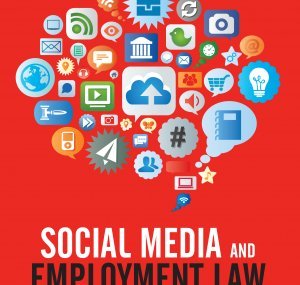
Social Media and Employment Law - Marleen Potgieter - Juta - R245
It’s Sunday morning. You are slightly hungover. Reaching for your smartphone, you vaguely recall that it was a helluva party. You also check your Twitter account and suddenly you feel very ill indeed. You didn’t really send out that string of abusive Tweets about your boss and the company did you? Oh no, you did! So how much trouble are you in? And would it make it any better if you said sorry, or sent out another Tweet saying that this is just your personal opinion? Oh, and by the way, your Twitter account is also linked to your Facebook timeline - the debacle is all over that medium, too.
Does any of this sound familiar? Hopefully not, but in this new world of social media, which also includes LinkedIn, WeChat, WhatsApp, Instagram, YouTube, Pinterest and a whole host of wannabes, you can’t be too careful.
Which is why former law firm partner and labour consultant Marleen Potgieter has taken the trouble to wade into the social media minefield, and to give both employer and employee a short guidebook. It is to her credit that she has taken a part of the law that is not only relatively new but also quite technical and rendered it highly readable. Social Media and Employment Law is an absolute must for anyone in the HR or employment field, but also journalists, bloggers and anyone else with a heavy online habit.
One catch-all warning: if you wouldn’t want to see those trenchant views about your boss all over the front page of the Sunday Times, you certainly wouldn’t want them on Twitter or Facebook either. The fact that it’s digital social media and not newsprint will make not the slightest difference to the judge who hears the defamation suit against you, nor will your defence that you had had too much wine and thought you were being funny. It might be social media, but many of the basic communication and media rules remain exactly as they always have been.
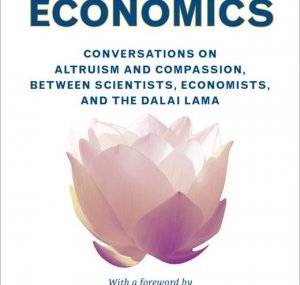
Caring Economics - Conversations on Altruism and Compassion, between Scientists, Economists and the Dalai Lama, edited by Tania Singer and Matthieu Ricard. Picador R295
A key tenet of classical economics is that human beings act out of pure self-interest. Every decision we take is predicated on maximising the benefits to ourselves and to increasing our happiness. As such, there is no such thing as altruism, nor could a nation’s economy be built in such a way as to reflect any altruistic impulses or tendencies.
Well, that’s the theory, except that a significant number of scientists and economists gathered together by the Dalai Lama’s Mind and Life Institute disagree. Their research into neuroscience as well as behavioural economics reveals that human beings are capable of doing good for others, and not just because it makes us feel good afterwards.
This book represents the proceedings of a conference held in Zurich in 2010, under the watchful eye of the Dalai Lama, at which the various strands of exploration towards a caring economy were pulled together.
The conclusion is startling. As the editors put it in their introduction, “The dialogues that ensued provided insights into the nature of economic systems and actions, and offered a new model for homo economicus as a fundamentally pro-social being.”
Caring Economics is packed full of insights about how humans think and behave; for that alone it’s worth the cover price, but it will also take you down a road very different from the one first signposted by Adam Smith.


